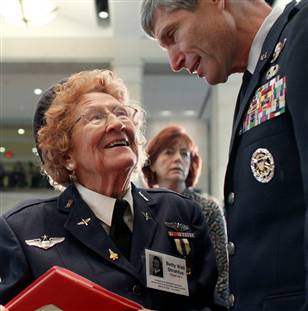 They flew non-combat missions, but 38 were killed in service
They flew non-combat missions, but 38 were killed in service
They flew planes during World War II but weren’t considered “real” military pilots. No flags were draped over their coffins when they died on duty. And when their service ended, they had to pay their own bus fare home.
These aviators — all women — got long-overdue recognition on Wednesday. They received the Congressional Gold Medal, the highest civilian honor given by Congress, in a ceremony on Capitol Hill.
About 200 women who served as Women Airforce Service Pilots, or WASPs, were on hand to receive the award. Now mostly in their late 80s and early 90s, some came in wheelchairs, many sported dark blue uniforms, and one, June Bent of Westboro, Mass., clutched a framed photograph of a comrade who had died.
As a military band played “The Star-Spangled Banner,” one of the women who had been sitting in a wheelchair stood up and saluted through the entire song as a relative gently supported her back.
“Women Airforce Service Pilots, we are all your daughters; you taught us how to fly,” said House Speaker Nancy Pelosi, the first woman to serve as Speaker of the U.S. House of Representatives. She said the pilots went unrecognized for too long, even though their service blazed a trail for other women in the U.S. military.
‘A bunch of tough old ladies’
In accepting the award, WASP pilot Deanie Parrish, 88, of Waco, Texas, said the women had volunteered without expectation of thanks. Their mission was to fly noncombat missions to free up male pilots to fly overseas.
“We did it because our country needed us,” Parrish said.
WASP Ty Hughes Killen, 85, of Lancaster, Calif., put it more simply: “We’re a bunch of tough old ladies,” she said in an interview.
Thirty-eight WASPS were killed in service in World War II. But they were long considered civilians, not members of the military, and thus were not entitled to the pay and benefits given to men.
They were only afforded veteran status in 1977 after a long fight. It’s estimated that about 300 of the more than 1,000 WASPs are still alive.
A day earlier, the women participated in a wreath-laying ceremony at the U.S. Air Force Memorial with the knowledge that it may be one of the last times so many of them could gather. Killen said it was the “gals who are watching from upstairs” she’s been thinking of.
“I really don’t care for publicity but what I really do care about is the 900 or more that are already dead and gone and have not had the cognizance and recognition that I feel they should have for their families,” Killen said.
Confusing the mechanics
Sens. Kay Bailey Hutchison, R-Texas, and Barbara Mikulski, D-Md., along with Reps. Ileana Ros-Lehtinen, R-Fla., and Susan Davis, D-Calif., led the push in Congress to get the women recognized.
Hutchison noted at the ceremony that when the unit was disbanded in 1944, many of the women had to pay from their own bus fare home from an airfield in Sweetwater, Texas. When some died on duty, it was fellow female aviators who helped pay their funeral expenses, she said.
The Congressional Gold Medal was awarded in 2000 to the Navajo Code Talkers and in 2006 to the Tuskegee Airmen.
Despite the danger and obstacles they faced, the women in interviews fondly recalled the camaraderie they shared.
“It was fun coming into a strange airport and having the mechanics say, ‘Where’s the pilot?'” said Dorothy Eppstein, 92, of Kalamazoo, Mich.
ATTENTION READERS
We See The World From All Sides and Want YOU To Be Fully InformedIn fact, intentional disinformation is a disgraceful scourge in media today. So to assuage any possible errant incorrect information posted herein, we strongly encourage you to seek corroboration from other non-VT sources before forming an educated opinion.
About VT - Policies & Disclosures - Comment Policy



